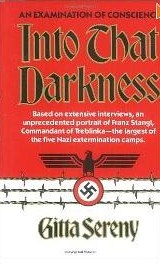Gitta Sereny
Into That Darkness: An Examination of Conscience

Honesty in journalism as well as in life
The sudden impression I had when finishing reading this great book was how ridiculous fiction can be when compared to reality. I had never read a book yet where truth was seeked more honestly and more compulsively than here. Bravo for Ms Sereny. I could see the interviews in my head, as I was reading, just like one of those old -but good- BBC documentaries. We follow the life of this man who was the Commandant of one of the extermination camps, and under whose eye perhaps a million civilian Jews were killed during WWII: we hear her wife's testimony, those involved in various ways, and of course, himself. The reporter writes so well, we can see how hard it must have been for her to keep from pronouncing judgments and letting her prejudices interfere with her questioning. Her efforts are well compensated by the results: truth was not to be obtained through any special skills of the interviewer, truth was to be obtained only freely, willingly.
The amazing thing was the ambivalence of feelings which these conversations produce in the reader. On the one hand we are faced with the crude reality of the death camps, we see clearly who the victims are and who are the criminals, if not by active engagement in the crimes, then by passivity or complicity. And on the other hand we cannot help but noticing the inner struggle of husband and wife when faced with their individual responsibilities. All the excuses you can imagine. We almost feel inclined to accept their explanations. But who can remove the guilt from their consciences?
Ms Sereny does not force the Stangl couple to admit their share of guilt, she does the hard thing: she make them judge honestly whether they were guilty or not. There are great lessons to be learned from this book.
